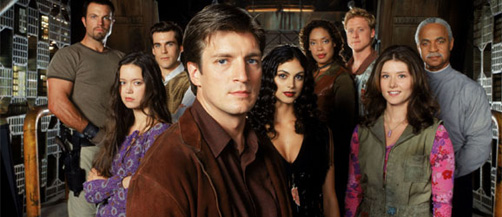Retrospective Movie Review: Serenity
Ten Years Later
By Ben Gruchow
September 29, 2015
Serenity is a perfect case study of what a film that is released ahead of its time looks like once its time catches up with it. Joss Whedon’s feature directorial debut - and by a commanding margin still his best piece of work in that sphere - did not fit easily into any category or tone exhibited in 2005 cinema, especially not among that year’s biggest financial successes - not as bleak and mythological as Batman Begins, not as breezy and inconsequential as Mr. & Mrs. Smith, and a far distance from the uptight sterility of Revenge of the Sith. This is to say nothing of how ill-fitting it was in 2002, when a similar tone premiered on TV with Firefly.
The timing of our subject’s 10-year anniversary is providential: in a little over 80 days, the first Thursday-night preview screenings will begin for The Force Awakens, and to look at the gigantic backward shift in the aesthetic from the prequels (compositing to real-world, digital sets to practical ones, early-gen HD to 35mm and 65mm film) is to witness a $200 million production realizing what constitutes a visually and viscerally appealing horse opera in space, 10 years after a $39 million oddity.
Serenity fits more comfortably into the sci-fi/fantasy cinematic aesthetic of the mid-2010s, and it’s startling how close to the top of that heap it would land if it were first released today. It has a decisive handle on tone. It doesn’t just traverse a tightrope between evoking grim consequentiality and anything-goes levity; it does backflips across it. It demonstrates clearly the universal truth that the impression and energy that CGI conveys is far more important to suspension of disbelief than photorealism. It is a movie where every one of its 109 minutes is essential—and yes, I know that the actual runtime of Serenity is 119 minutes. I’ll get to that.
A big component of how a film rates to me is the degree of investment in the material and the level of confidence in the world that the story creates. It’s why a nutty B-movie like American Ultra warrants a positive assessment, and a nutty B-movie like Transporter Refueled does not. Sometimes a filmmaker can fake investment when it’s not really there, and Joss Whedon is not one of those people; you can absolutely tell when he’s checked out or burned out of a project.
Serenity finds Whedon at perhaps the most emotionally invested he’s ever been in a project, and it gets an added boost from the playground he’s in. Unlike the Avengers movies, which really belong to Kevin Feige, or even Buffy the Vampire Slayer, which backed itself into a thematic corner with the fifth season and spent the final two years after that awkwardly trying to establish a new concept and metaphor, this universe had an open canvas to play with. The freedom that this allocated is evident.
Watching the movie, we get the undeniable sense that each frame is about exactly what Whedon wanted that frame to be about, in exactly the way Whedon wanted it to be. It is a film that is good because the production is mechanically adept, and made unique by a stunning clarity of vision. That this is a rarity in any release barely needs to be acknowledged.
Continued:
1
2
3
|
|
|
|




